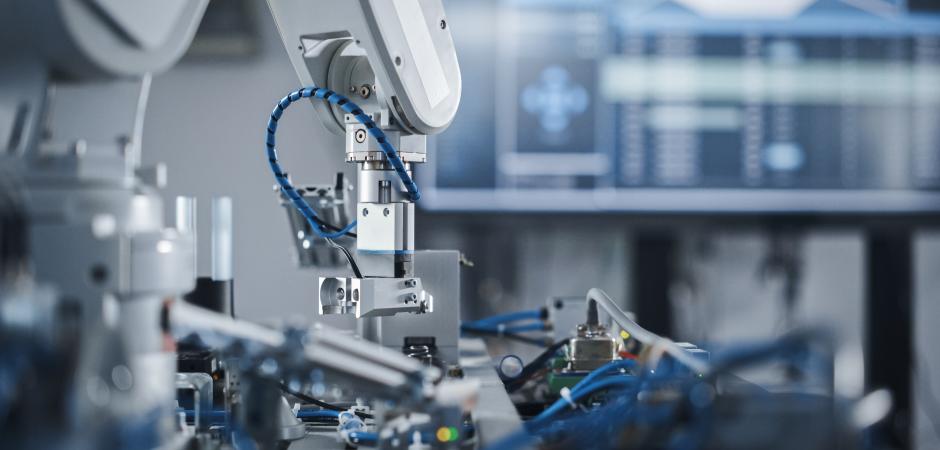
Sumcab Specialcable Group has been offering services related to cable development and manufacture for all types of applications for 25 years.
The industrial sector plays a major role in the global economy due to its diversity of specialisation areas. This has led to a investment requirement for different resources and technology when adapting cables to this industry.
There is a wide variety of applications within the industrial environment. Since each application requires a specific product, it is essential to adapt to the requirements and specifications of each installation. However, despite the great diversity of cables in the industrial sector, the different types can be classified.
Here are the most commonly used cable types in the industrial sector industrial and the various applications in this market.
Sumcab cables in the industrial sector
The industrial sector encompasses many sub-sectors, each with different requirements for the cables to be used.
Some of the industrial environments in which Sumcab is working on numerous projects at this time include:
- Food and beverage.
- Automotive industry.
- Machinery and tool manufacturing.
- Pharmaceutical.
- Fusion and nuclear.
- Power generation.
- Wood and pulp.
- General manufacturing.
- Metallurgy.
- Mining and minerals.
- Oil and gas.
- Packaging.
- Chemicals.
- Inspection robots.
- Irrigation systems.
- Submarine.
- Water treatment.
Each and every one of these industries requires specific cables to meet customer requirements. Product adaptation and customisation are crucial.
The most common industrial cable types
Obviously, there is an extraordinary quantity and variety of cable types for each industrial sector, although a more general classification can be established that encompasses most of them.
PVC cables
PVC cables have a polyvinyl chloride coating and are usually chosen for work areas in which there is moderate mechanical fatigue. These cables are highly resistant to chemicals and toxins and although there are many applications for them in industrial environments, they are most commonly used in the food industry.
PUR cables
Polyurethane cables, known as PUR cables. These cables are halogen-free and have excellent mechanical, chemical and fire resistance. They are also highly flexible. All these features make them a good choice for all types of machinery and tools and for assembly and production lines.
PUR A cables
PUR A cables are sometimes used when higher resistance is required. They offer mechanical resistance to chemicals and oils; they are also fire-resistant and don't deteriorate from sparks such as welding sparks. These specifications make PUR A cables especially designed for use in installations in the automotive industry.
PUR U cables
Drag chains and dividing plates used in various industries require cables that can withstand very demanding conditions. The mechanical and oil resistance of PUR and PUR A cables may not be sufficient. So in these cases, PUR U cables are chosen, which also have excellent fire resistance.
PUR OD cables
Moving up a notch in terms of resistance, there are the PUR OD cables, which can withstand temperatures from -5ºC to 105ºC. This makes them ideal for outdoor industrial applications, as well as for mobile equipment, as they can perfectly withstand continuous exposure to UV rays, sea water and abrasive agents such as oil and diesel.
STOOW cables
Other varieties are also used in the automotive industry, such as STOOW cables, with a PVC compound that has been developed to withstand the toughest conditions. They can withstand voltages of up to 600 V, as well as exposure to chemicals and oils.
POC cables
POC coating is used on cables that will be very close to welding processes. They have thermal resistance of up to 150ºC and great mechanical strength. They are highly recommended in the metallurgical industry y and in any environment in which there is extreme heat.
Power cables in the industrial sector, one of the most used types
There are many other classifications based on other variables when differentiating cable types for the industrial sector. Of them all, there is one cable type that has a multitude of specifications; it is called the “power cable”.
Power cables can be single- or multi-conductor and are individually insulated with PVC, then grouped and coated with a protective PVC sheath.
Depending on the environment in which the power cables are to be used, they may include additional coating to prevent wear or deterioration.
They are designed to withstand different conditions and situations: high humidity, constant movement, being in contact with water or always being outdoors.
Power cables are also very flexible and so several conductors can be grouped into a single cable.
They are mainly used in mobile equipment, construction projects, agricultural infrastructure, mines, renewable energy installations and, in general, in projects in which low-voltage electricity is required.
Would you like to know more about the different cable types that Sumcab develops? Sumcab specialises in a multitude of applications and would most certainly have the right solution for your company or the sector in which you operate. Please contact us to receive personalised advice on the products that Sumcab can develop specifically for your requirements.

